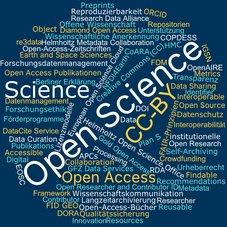
Open Science is a movement that aims to make scientific research more accessible, transparent, and reproducible. It encompasses practices such as Open Access publishing, sharing research data and software, fostering collaboration across disciplines and institutions. A crucial aspect and challenge of Open Science is linking various research outputs—such as texts, data, samples, and software—and uniquely identifying authors and institutions in a digital, machine-readable, and citable format. This process ensures that data producers and their institutions receive proper recognition for their contributions.
Open Science strengthens confidence in scientific findings and speeds up the sharing of knowledge. Fully implementing Open Science also necessitates a shift in research culture and the scientific reward system to acknowledge and reward contributions from individuals in various roles throughout the data lifecycle, aligning with the principles of the San Francisco Declaration on Research Assessment (DORA) and the Coalition for Advancing Research Assessment (CoARA).
The Data and Information Management section has been actively engaged in the development of Open Science since its inception, notably with the Berlin Declaration on Open Access to Knowledge in the Sciences and Humanities in 2003. The GFZ library was among the first digital libraries in the geosciences and played a leading role in the Helmholtz Open Science Office until 2021. It was a partner in the DFG project STD-DOI – Publication and Citation of Primary Data (2003-2007) auf, which introduced the DOI for research data, and which resulted in the founding of the DOI registration agency DataCite. As part of this project, the first dataset DOI was registered at GFZ on September 12, 2006.
Since then, the Section has helped to shape open access to knowledge within the framework of numerous projects. These include, among others, (1) re3data, the interdisciplinary register for research data repositories, which continues today as the DataCite service, (2) the Research Data Alliance (RDA), (3) the Coalition for Publishing Data in the Earth and Space Sciences (COPDESS), which, together with publishers and repositories, has achieved important impulses for the recognition of research data in the geosciences, OneGeochemistry, and at national level the Helmholtz Metadata Collaboration (HMC) and the Earth System Science Consortium of the National Research Data Infrastructure NFDI4Earth.
Since then, we have helped shape open access to knowledge within the framework of various projects and initialives. These include re3data, the global Registry for Research Data Repositories, which continues today as a DataCite Service, the Research Data Alliance, and the international Coalition for Publishing Data in the Earth and Space Sciences (COPDESS), which, together with publishers and repositories, has provided important impetus for the recognition of research data in the geosciences and continues this work actively to this day.
At the national level, we coordinate the Specialised Information Service for the Geosciences (FID GEO) which actively promotes and supports Open Science in the Geosciences in German through a network of national geosciences societies, offers text and data publication services through the partner repositories GEO-LEOe-docs and GFZ Data Services and is widely recognised as a national competence for Open Science in the Geosciences. We have also continuously further developed our data publication services via the domain repository GFZ Data Services (FAIR principles, comprehensive metadata, data description templates) and extended them to scientific software and physical samples (IGSN). Today, GFZ Data Services is internationally recognized and used as a place for the publication of well-curated geoscientific data.
By embracing Open Science with all services (Open Access publications and transformation, GFZ Data Services, FID GEO), the GFZ Section Data and Information Management enhances the impact and reach of our research, fostering a more collaborative and transparent scientific community.